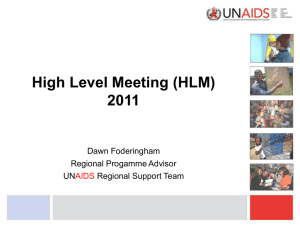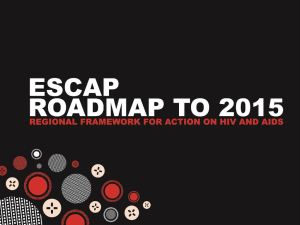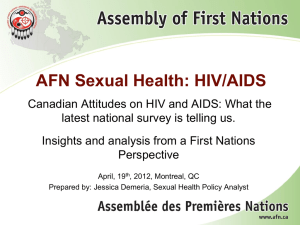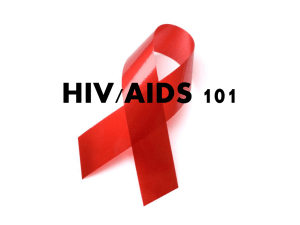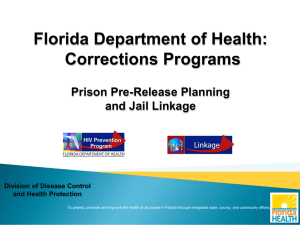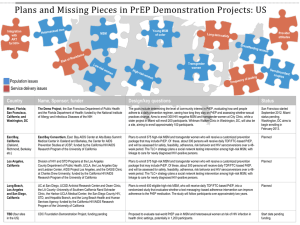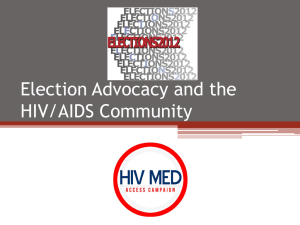Orientation for New Members of the New Jersey HIV Planning Group
advertisement
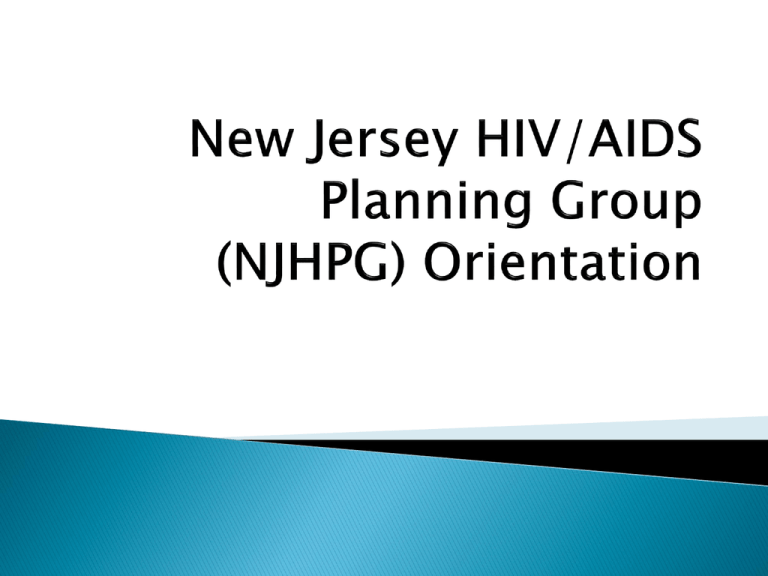
What is the NJHPG? The New Jersey HIV/AIDS Planning Group (NJHPG) is a collaborative formed by the New Jersey Department of Health, Division of HIV, STD, and TB Services (DHSTS) that combines HIV Care and Treatment and HIV Prevention planning efforts. What are the goals of the NJHPG? To make the best use of resources for both HIV Prevention and Care and Treatment Services across the state To improve the efficiency and effectiveness of HIV planning in the state of New Jersey To unite both HIV Prevention and HIV Care and Treatment services into one cohesive HIV Planning Group It is a process in which people from different walks of life and different interests, responsibilities and/or involvement in HIV/AIDS services come together as a group to plan how to prevent HIV infection throughout New Jersey and provide Comprehensive care for those who are living with HIV/AIDS. What is HIV Prevention? HIV Prevention services in New Jersey are funded through the Centers for Disease Control and Prevention (CDC) and DHSTS Includes interventions, strategies, programs and structures designed to change behaviors that may lead to HIV infection or other diseases What is HIV Care and Treatment? The Ryan White HIV/AIDS Treatment Modernization Act is the federal legislation responsible for HIV Care & Treatment Services. Ryan White funds are used to develop and maintain a service delivery system – known as “a continuum of care” – of medical and support services for medically underserved individuals and families affected by HIV disease. The NJHPG and DHSTS: ◦ Work together to carry out the activities required from the Health Resources and Services Administration (HRSA) and the CDC ◦ Utilizes evidenced based and objective data such as: HIV/AIDS statistics Epidemiologic profile Financial data Service utilization data ◦ Incorporates the views and perspectives of groups infected and affected by HIV/AIDS including: Those living with HIV/AIDS Those at high-risk for HIV infection HIV service providers Public policy makers General public 1. Review the DHSTS Epidemiologic Profile In reviewing the epidemiologic profile on an annual basis, the NJHPG can assess and describe the impact of HIV/AIDS in defined target populations in New Jersey. 2. Conduct a Needs Assessment The NJHPG (in collaboration with DHSTS) conducts an assessment of the HIV prevention and HIV care and treatment needs throughout the state. 3. Maintain a Resource Inventory The NJHPG maintains a resource inventory of all HIV prevention and HIV/AIDS care and treatment services in New Jersey to determine its capacity to respond to the HIV/AIDS epidemic. 4. Conduct a Gap Analysis The NJHPG conducts an analysis of the gaps in the HIV/AIDS Services System to assess the capacity and resources of the system in meeting the needs of: ◦ Clients using HIV prevention and HIV care and treatment services ◦ Clients who are HIV+ and not in care; and ◦ Getting individuals who are unaware of their HIV status tested, and if positive, linked to care Required Planning Activities 5. Identify Potential Strategies and Interventions The NJHPG identifies strategies and interventions proven effective in the prevention of new HIV/AIDS infections in the high-risk populations defined in the epidemiologic profile, needs assessment and resource inventory. 6. Identify Care and Treatment Needs The NJHPG identifies the service needs and resources (governmental and nongovernmental sources) necessary to fund care and treatment services for those who are infected with HIV/AIDS. This also includes identifying any disparities in access to treatment or lack of services provided in historically underserved communities. 7. Update the Statewide Coordinated Statement of Need (SCSN) The NJHPG updates the SCSN document as needed. The focus of the SCSN document is to identify the issues impacting a client’s ability to access HIV care and treatment services. The NJHPG provides recommendations for addressing these barriers and enhancing statewide HIV/AIDS services funded by the Ryan White Treatment Modernization Act. 8. Produce a Statewide Comprehensive HIV/AIDS Services Plan The NJHPG will develop the Statewide Comprehensive HIV/AIDS Services Plan to document the group’s activities and recommendations for the provision of HIV prevention and HIV care and treatment services within the state. The Plan is updated on an annual basis. 9. Review DHSTS’ Application to the CDC for Federal Funding The NJHPG will review the annual DHSTS application to the CDC for Federal HIV/AIDS Prevention funds. The NJHPG assesses how well the priorities listed in the Statewide Comprehensive HIV/AIDS Services Plan are represented in the application and how the distribution of funding matches the group’s recommendations for services. Upon completion of the review, the NJHPG will provide a Letter of Concurrence, Concurrence with Reservation or Non-Concurrence with DHSTS’ application. 10. Maintenance of the NJHPG The NJHPG is responsible for formulating and implementing policies and procedures that address the following: The composition, selection and terms of office for NJHPG members to ensure that its membership: ◦ Is reflective of the state of the epidemic in New Jersey ◦ Includes people living with HIV/AIDS ◦ Is representative of all Ryan White Parts (e.g. A, B, C, D and F) Defining the roles and responsibilities of NJHPG group and committee members Defining procedures for reaching decisions, attendance at meetings, resolution of disputes and conflict(s) of interest for members of the NJHPG Determining and using the most effective mechanisms for incorporating the public’s input into the HIV/AIDS service planning process Providing a thorough orientation for new members Tracking and evaluating the effectiveness of the planning process NJHPG Structure HRSA CDC DHSTS CPSDI Rutgers NJHPG NJHPG Chair NJHPG DHSTS State Vice-Chair NJHPG Community Vice-Chair Executive Committee Governance Committee HIV/AIDS Issues Committee Elected Representatives Public The membership of NJHPG is maintained by the Governance Committee through an open nominations process, allowing anyone to submit an application to the NJHPG Membership Recruitment of members is guided by the principles of parity, inclusion and representation (PIR) as defined by the NJHPG: P Parity: The ability of community planning group members to equally participate and carry-out planning tasks or duties in the community planning process. To achieve parity, representatives should be provided with opportunities for orientation and skills-building to participate in the planning process, and have equal voice in voting and other decisionmaking activities. I Inclusion: Meaningful involvement of members in the process with an active voice in decision making. An inclusive process assures that the views, perspectives, and needs of all affected communities are actively solicited. R Representation: The act of serving as an official member reflecting the perspective of a specific community. A representative should reflect that community’s values, norms, and behaviors, and have expertise in understanding and addressing the specific HIV prevention and/or care and treatment needs of the population. Representatives also must be able to participate in the group and objectively weigh the overall priority prevention needs of the jurisdiction. Membership Minimum of 30, maximum of 40 NJHPG members who are representative of the state of the epidemic in New Jersey Strive for 30% demographic representation of People Living with HIV/AIDS Each NJHPG member will serve for a term of two years The NJHPG elects one Chair and one Community Vice-Chair for a two-year, staggered term of office. There will be a two-term limit for the offices of Chair and Community Vice-Chair. Leadership DHSTS appoints one State Vice-Chair annually The NJHPG Chair and Vice-Chairs share responsibility for guiding the group and its committees in accomplishing its objective and goals The NJHPG conducts the majority of its planning activities in the following standing committees: ◦ Executive ◦ Governance ◦ HIV/AIDS Issues Every member of the NJHPG is expected to serve on at least one committee (per the “Time Commitment of Membership” on the Membership Application cover page). The Committee is charged with ensuring that all NJHPG activities are conducted in accordance with guidelines from HRSA, the CDC and the NJHPG’s By-Laws and Policy and Procedures. The Executive Committee also ensures that planning activities are completed in accordance with deadlines given by DHSTS and the federal government. Consists of NJHPG members who hold the following positions: Chair and Vice-Chairs; Chairpersons of all standing committees and workgroups; and Three At-Large Members from the Northern, Central and Southern Regions Executive Committee Regional At-Large Members: Are elected by the NJHPG for a one year term to represent Northern, Central or Southern New Jersey Responsible for sharing any issues, concerns, current events, etc. occurring in their region Serve as an advocate for any NJHPG member in their region Consists of NJHPG members only Is responsible for conducting the NJHPG nominations process Is responsible for drafting the NJHPG’s By-Laws and Policies and Procedures Manual (approved by the full planning body) to ensure that the NJHPG meets federal planning body mandates Consists of both NJHPG members and members of the general public Is charged with identifying issues that affect HIV/AIDS Services in New Jersey through the exploration of current events including: ◦ ◦ ◦ ◦ Consumer Issues Advocacy Updates State/Federal Budget Changes New Legislation The HIV/AIDS Issues Committee also conducts the development and implementation of NJHPG products such as the needs assessment and gap analysis. These products are used by the NJHPG as key resources in the development of planning recommendations at the federal (HRSA, CDC) and state (DHSTS) level. May consist of NJHPG Members and members of the public Are formed to address specific issues of importance to HIV/AIDS Services. All workgroups must be approved by the Executive Committee. Upon completion of their charge and submission of all findings and recommendations to the NJHPG for review and action, Workgroups will be disbanded. Code of Conduct NJHPG Members must: ‣ Make a commitment to the process and the results ‣ Participate in all decision-making activities ‣ Separate agency/organization goals and objectives from the needs of the NJHPG ‣ Put aside personal agendas Any disagreements with the work conducted in Committee should be handled in Committee. Once a decision is made at the Committee level, it should be supported by every member of that Committee. Membership NJHPG Members are elected by a simple majority vote for two year terms Following the end of their two year term, members may be re-appointed All membership elections are completed via closed ballot 1. Regularly attend all main and committee meetings; 2. Within two months of election, all members are required to join and participate in at least one of the following committees: 1. Governance 2. HIV/AIDS Issues Committee 3. Gather data and provide information that is useful to the NJHPG planning process Membership Responsibilities 4. Gather data and provide information that is useful to the NJHPG process 5. Declare any conflicts of interest annually and recuse yourself during a vote when appropriate 6. Actively recruit applicants to the NJHPG Membership Responsibilities 7. Review meeting material in advance 8. Come to the meetings prepared to actively participate 9. Contribute to the development of the Statewide Comprehensive HIV/AIDS Services Plan 10. Assess the responsiveness of DHSTS’ application to the CDC with the priorities identified in the Comprehensive HIV/AIDS Services Plan Members are expected to attend all main committee and workgroup meetings Absences will be considered either excused or unexcused For an excused absence, members should call or leave a message with NJHPG Staff no later than one hour prior to the meeting Attendance Policy Main Meetings ◦ Any member with (1) three unexcused absences within a 12 month period; or (2) five total absences within a 12 month period; or (3) two consecutive unexcused absences shall be considered to have resigned. Any member considered to have resigned under this rule will be notified in writing by NJHPG Support Staff and may choose to appeal. Attendance Policy Committee Meetings ◦ Any member with (1) more than two unexcused absences or (2) three consecutive absences (whether excused or unexcused) from committee meetings in a year will be considered to have resigned as a member of that committee ◦ Any member may apply for a leave of absence (please see NJHPG By-laws Article III, Section 7). Main NJHPG meetings are held on the third Thursday of each month on the Rutgers University Campuses. Meetings are generally from 9:30 a.m. to 1 p.m. Main meetings break from June through August. Committee and Workgroup meetings are generally held monthly at Rutgers University, ASB III in New Brunswick. They normally convene from 10 a.m. to 12 p.m. (including the summer months). Prior to the meeting, NJHPG Staff will email the Agenda, draft minutes from the previous meeting, directions and a parking pass. The NJHPG Meeting Schedule can also be found at: http://hpcpsdi.rutgers.edu/ The NJHPG webpage also provides you with: A Document Library containing research on issues that are vital to the HIV Planning Process NJHPG Work Products, Guidance, Planning Documents and Forms (including Travel Reimbursement for eligible members) PowerPoint Presentations given to the NJHPG at previous meetings You are expected to: ◦ Familiarize yourself with the NJHPG Webpage ◦ Review the NJHPG By-Laws and other planning documents ◦ Attend the next Main Meeting and join a committee within two months ◦ Introduce yourself to a current member of the NJHPG who can assist you in understanding the planning process Rutgers University HIV Prevention Community Planning Support and Development Initiative (HPCPSDI) provides administrative support and technical assistance to NJHPG To reach a Rutgers staff member: hivstaff@rci.rutgers.edu or 848-932-4189 This concludes the NJHPG Orientation. In order to receive credit for taking this orientation, please fill out the NJHPG Orientation Evaluation at: website On behalf of the NJHPG Executive Committee, thank you for committing your time and expertise to this important planning process.
